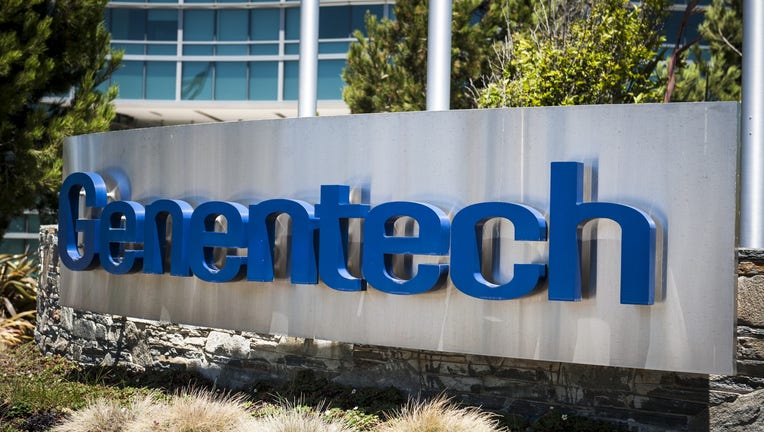This Bay Area company is leading the way in menopause care for workers

Genentech sign at its South San Francisco, Calif. headquarters.
SOUTH SAN FRANCISCO, Calif. - A Bay Area biotech giant is receiving growing attention for its approach to a topic that has been historically stigmatized and often taboo in workplace discussions.
South San Francisco-based Genentech is providing support benefits for women employees who are going through menopause, while also trying to build awareness about this natural stage in a woman's life.
"Our menopause benefit features a digital health platform providing 24/7 personalized support including on-demand video appointments with clinicians specializing in every stage of the menopause journey, provider-led classes and articles on managing menopause symptoms," a Genentech spokesperson told KTVU in an email correspondence.
The company said benefits also include referrals to in-person providers, who are experts on menopause, as well as drop-in support groups.
The program also helps find a nutritionist, as well as a wellness coach, a mental health provider and career and physical support coaches.
Dig deeper:
The support is comprehensive, and the costs are covered not only for employees facing menopause, but also for their spouse or partner.
Treatments like hormone replacement therapy run through employees' medical coverage, the company said.
But other benefits go beyond what the company's medical plan offers, the spokesperson explained to KTVU, noting that on-demand appointments with numerous specialists come at no cost.
The backstory:
The program was launched back in 2023, symbolically on International Women's Day, March 8.
Genentech said it has been a pioneer in the biotechnology world for almost half a century, and the genesis of its menopause program was similar to the way it’s paved its place in the biotech industry.
"It was our own employees – the source of many of our best ideas – who raised the issue of menopause in the workplace," the company explained.
It was during a meeting held by the Genentech Women Professionals employee resource group, which the company noted was open to all employees, that some members spoke about the challenges related to dealing with symptoms of menopause at work.
The company said it heard these comments and took action by creating the support services.
"Our efforts underscore the value of creating an inclusive culture where women’s health needs are met holistically, helping to ensure that all employees can show up as their best selves," the spokesperson told KTVU.
Genentech’s Chief People Officer, Cori Davis, has spoken openly about her own challenges with menopause and has been a driving force in trying to bring awareness to the health issues related to this stage, while seeking ways to ensure employees feel seen and heard.

Genentech Chief People Officer Cori Davis has helped establish the company's menopause-specific benefit support program.
"It’s critical that leaders invest time to understand their employees’ needs and challenges," Davis told KTVU in a statement. "This contributes to being a successful and thriving business. Understanding the unique needs of women helps drive an inclusive culture and can improve productivity and retention," she added.
Menopause and workplace productivity
Researchers from the Mayo Clinic found in the U.S., the cost of lost work time due to menopause symptoms is estimated to be $1.8 million a year. That price tag soared to $26.6 billion annually when medical expenses were added.
The findings identified a link between menopause symptoms and adverse work outcomes, including decreased productivity, absenteeism, and lost opportunities for career advancement.
In an email, the study's co-author Dr. Jewel KIing told KTVU, "Our research has demonstrated the significant economic burden untreated menopause symptoms have in the US. Beyond this, menopause can have significant negative impacts on women, particularly at important times in their career trajectory."
A recent Stanford University study found that women who are in the perimenopause or menopause phases make up an estimated 20% of the U.S. workforce.
The study showed women experiencing menopause faced a significant decline in earnings, as they cut back on work or even quit.
"The economic losses are substantial," Stanford researchers said. "Estimates show that, four years after a menopause-related diagnosis, earnings decline by 10%."
SEE ALSO: US birthrates: People over 40 giving birth surpass teens for first time
Kling applauded initiatives like those launched by Genentech as a way to effectively address these issues.
"By offering support such as educational resources, flexible work options, and access to medical care, companies can ease the burden on employees and improve overall well-being and productivity," she said.
Symptoms
While hot flashes and mood swings are the stereotypical symptoms associated with menopause, the side effects are more far-ranging for many women, and can include symptoms like brain fog, decreased energy, sleep disturbances and joint pain.
Researchers have found declining hormone levels from menopause can also lead to increased risk of cardiovascular disease and can affect bone health.
"During the menopausal transition, the body’s production of estrogen and progesterone, two hormones made by the ovaries, declines greatly," according to the National Institute of Aging.
Figures show, on average, menopause happens at the age of 52. It's defined as the point when a woman has gone 12 consecutive months without a menstrual period.
How long symptoms related to menopause last varies widely among women, with research showing that factors can include genetics, race, and lifestyle.
"You can have symptoms of menopause for up to 10 years before it officially occurs," according to the Cleveland Clinic. "The average length of menopause symptoms is about seven years," the academic medical center noted.
Treatments used to ease symptoms include hormone therapy, lifestyle changes, as well as alternative medicines.
Serving as a model
Genentech said its efforts go beyond addressing menopause within its own workplace.
"We hope to serve as a model for other companies by demonstrating the importance and benefits of supporting women through all stages of their lives, including menopause," Genentech said, adding, "We encourage other organizations to consider implementing similar comprehensive support programs."
Since the program’s launch, the company said it’s had 1,450 employees and their spouse or partner utilize the services.
And the feedback from those who have taken advantage of the benefits has demonstrated the success of the program, according to the company.
"We’ve received overwhelmingly positive anecdotal feedback from women saying they truly feel seen," the company said as it shared comments from a recent survey.
What they're saying:
"My wellness coach met me where I am physically and we set low goals I can meet, not striving for perfection," one employee said.
Another shared, "My OB is amazing. She provided insights as well as recommendations re: symptoms that weren't being adequately managed."
Other support efforts
This push to support women going through menopause has been seen in various forms by other companies, including Santa Clara-based tech giant Nvidia.
The company has partnered with digital health platform Peppy to offer support for employees and their partners.
"Features include one-on-one consultations with specialists, access to online resources, and guidance on topics such as mental well-being, nutrition, fitness, and lifestyle adjustments," the company told KTVU in a statement, adding, "The offering reflects NVIDIA’s commitment to address the diverse health needs of employees and their families."
Health experts say these programs are playing a critical role in changing the discussions and attitudes around menopause.
"It does appear that a broader movement is emerging to raise public awareness and ensure that women have the knowledge, support, and options they need to navigate this natural stage of life with confidence and dignity," Dr. Kling said.
Legislative efforts
And beyond private entities, there has been a push to offer improved support on a legislative level.
Earlier this year, Assemblymember Rebecca Bauer-Kahan (D-Orinda) introduced the Menopause Care Equity Act, which seeks to expand insurance coverage for menopause-related treatments in an effort to ensure that women receive equitable menopause and perimenopause care.
Assembly Bill 432 also requires menopause education for doctors whose patient population is more than 25% women.
The bill has received the attention and support from groups like the California Legislative Women's Caucus as well as from academy-award-winning actress Halle Berry.
"We have been underserved for far too long. I look forward to working together this year to ensure it gets signed into law," Berry said.
The actress has emerged as a global advocate for menopause awareness and research.

MAY 2: Halle Berry speaks during a news conference on bipartisan legislation to raise federal research on menopause and women's midlife health, outside the U.S. Capitol on Thursday, May 2, 2024. In the background from left, Sens. Amy Klobuchar, D-Min (Tom Williams/CQ-Roll Call, Inc via Getty Images)
Barry said that AB 432 addresses the profound inequities faced by women seeking menopause healthcare.
Bauer-Kahan’s office said the healthcare system fails many women when it comes to the proper diagnosis, care, and treatment of menopause, saying that only 19% of women, aged 40 to 60, who experience symptoms actually receive an official menopause diagnosis.
And 73% of women are not treating their symptoms, which can ultimately lead to unnecessary health risks and economic burdens.
Companies like Genentech hope to move the needle toward a more inclusive space and culture in which women’s health needs are met.
"The more we normalize these important conversations," Davis said, "the more comfortable women will be to share their needs and seek support."
Menopause awareness and support
Bay Area biotech giant Genentech is offering a comprehensive program to help women employees going through menopause. On the Nine, Gasia Mikaelian speaks with Cori Davis, Genentech's Chief People Officer, and Lisa Raja, a certified menopause coach, on the topic that has historically been a "taboo" topic of discussion in many spaces.

